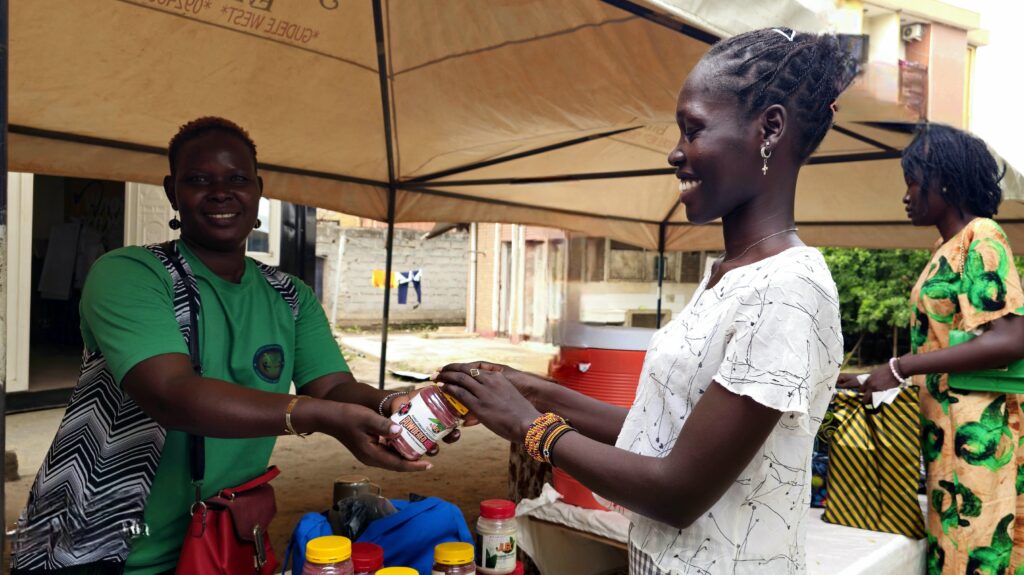With South Sudan ranked by the International Monetary Fund as the world’s second-poorest country in terms of per-capita income—just $422 annually—economic prospects remain bleak, especially for young people. Yet amid staggering unemployment, a growing number of South Sudanese youth are refusing to accept joblessness and poverty. Instead, they are launching businesses from scratch, often without government support or access to formal financing.
At the forefront of this entrepreneurial push is Juan Scovia, co-founder of Jusco Enterprise Ltd., a small startup producing Krekede, an organic hibiscus tea.
Scovia’s journey began after she returned to South Sudan in 2016 following studies in Uganda. After a short stint with a humanitarian organization and a failed attempt to run a shop in Juba’s Gudele Market—shut down, she says, by excessive municipal taxes—she turned to a venture rooted in local culture and health.
“Everything we consume here is imported,” she said. “I asked myself—why can’t South Sudanese eat something that’s purely organic and made by us?”
“Many people think South Sudanese can’t produce anything of quality. But we have the capacity. What we lack is empowerment,” Scovia added.
Launched in March 2025, her company produces powdered hibiscus tea in three blends: cinnamon, ginger and cloves, with lemongrass soon to come. She markets her product mainly through workshops and word of mouth, earning up to 350,000 South Sudanese pounds (SSP) on good days.
“My tea doesn’t cause heartburn like the ones in teabags. It’s purely organic—just hibiscus with cloves, cinnamon or ginger,” she said.
Still, challenges persist.
“The machine I use is very small. It takes a long time to process small quantities,” she explained. “It’s so tiresome—I dream of owning a warehouse with proper packaging and blending machines.”
Though still in its early stages, Jusco Enterprise represents more than just a business for Scovia—it’s a vision for South Sudan’s youth. She hopes to employ at least 30 young people within five years and eventually 1,000 as the company expands nationwide. To achieve this, she is seeking $20,000 in capital to buy equipment, register the company and obtain certification.
“If I can register and get certified, I’ll compete with imported products and even export to Uganda and Kenya,” she said. “But I don’t want to do this alone. I’m open to partnerships, investment, mentorship—anything that helps us grow together.”
She also envisions expanding beyond hibiscus.
“People know South Sudan for lulu oil and honey—organic products loved across East Africa. I want to brand something that screams: this is South Sudanese.”
But first, she says, she must stabilize her current line.
“You can’t multitask too much when you’re still small,” she noted. “First, let me master hibiscus. Then I’ll scale up.”
For Scovia, her work is more than commerce—it’s a cultural statement. Yet barriers remain. Without certification from the South Sudan National Bureau of Standards, her products can’t be sold in supermarkets. She also criticizes city council regulations that stifle small vendors.
“We’re struggling with inflation, unstable prices and no government protection,” she said. “The system pushes you out instead of lifting you up.”
According to the World Bank, more than 80% of South Sudan’s population lives below the poverty line, with youth unemployment estimated at over 50%. Formal jobs—particularly outside the humanitarian sector—are scarce. Still, young people are innovating to fill the gap.
Development experts say initiatives like the Youth Market Event, which connects entrepreneurs with customers and training, are important but insufficient. More structural support is needed.
“We need policy changes to reduce taxes on startups and invest in vocational and business training,” said a local economic analyst attending the event. “Young people are showing the way—now the system must catch up.”
That lack of support is echoed by Shamila Abdallah, chairperson of the Central Equatoria Civil Society Network.
“So far, there is nothing—not even a clear government policy saying, ‘Here is what we are offering to unemployed youth,’” she said.
Some donor-backed programs exist, such as a World Bank-funded business grant administered through the Ministry of Trade and the International Rescue Committee. But Shamila argues these are not enough.
“The biggest gap is the framework between government and youth,” she said. “We need the ministries—Trade, Gender, Labor—to sit with us, with the youth, and chart a path forward.”
She called for skills training in agriculture, nutrition and artisanal crafts, emphasizing how local production of sanitary pads could help keep girls in school.
“We import everything, even food and pads for girls,” she said. “But we have the resources to produce these locally if youth are supported.”
Her network is organizing a national youth exhibition—pending funding—to showcase innovation across South Sudan.
The Youth Market Event, run by the Youth Empowerment Organization, offers a lifeline for entrepreneurs like Scovia. Held monthly in Juba, it provides vendors with sales opportunities, financial literacy workshops and networking.
“We cannot say the government or NGOs will employ us all,” said Daniel Mwaka, the group’s executive director. “So, we are advising young people to create opportunities for themselves and employ their peers.”
“This is how you build a country: through small businesses, taxes and people employing each other,” he added. “But we need city councils to stop taxing young businesses harshly. Let them grow first.”
Mwaka hopes to partner with banks to expand financial education, helping young entrepreneurs access loans and reinvest.
“Young people can’t get loans,” he said. “We want to bring banks on board, give youth financial skills and show them how to manage and reinvest.”
From organic tea and traditional crafts to dried okra and branded snacks, the products on display reflect youth-led resilience.
As South Sudan moves toward elections in 2026 and continues recovering from years of conflict, unlocking economic opportunity for young people will be crucial for stability.
“We want to work with the government,” Shamila said. “But first, the government must work with us.”




